Physician Introduction on Short Bowel Syndrome (SBS) and Intestinal Failure
Presented by Adam Stein, MD

Presentation Overview
Physician Introduction on Short Bowel Syndrome and Intestinal Failure
Adam C. Stein, MD
Northwestern Medicine
Everyone needs to stay nourished and hydrated to survive. If we don’t get enough fluids or nutrition, eventually our vital organs will malfunction, which leads to illness and even death. In medicine, we call this process intestinal failure. Intestinal failure is any condition that causes someone to get less nutrition or hydration than their body needs.
A number of different conditions can cause intestinal failure. Typically, these conditions can be divided into two causes: medical conditions and surgery.
Medical conditions:
- Intestinal blockage (such as tumors, scar tissue, congenital disorders like Hirschprung’s disease, necrotizing enterocolitis)
- Cancer (tumors causing a blockage, chemotherapy leading to nausea/vomiting, mucositis, radiation therapy leading to intestinal damage (radiation enteritis), amyloidosis (protein buildup in the lining of the intestine that blocks absorption)
- Flow/motility disorders (gastroparesis, intestinal pseudo-obstruction, systemic sclerosis (scleroderma))
- Inflammation (Crohn’s disease, autoimmune enteritis, celiac disease)
- Ischemia (lack of blood flow to the intestines leading to pain, bleeding, and potentially surgery)
Surgery:
- Short bowel syndrome (when part of the intestines are removed during surgery, leading to shorter intestine length which causes decreased ability to absorb fluids and nutrients)
- High ostomy output (ostomy is when your intestines are rerouted so that stool empties out of your belly, typically into a bag; sometimes your intestines empty too much)
Treatment of intestinal failure, regardless of the cause, involves an individualized multi-disciplinary team approach. The team is typically led by someone experienced in intestinal failure, and built around the person’s individual needs. This usually includes specialists that help with any complications that arise (for example, an infectious disease specialist if there are problems with catheter or wound infections, a pharmacist to help with dosing medications, or a dietitian to help with choosing the right foods to eat or formulas if one has a feeding tube).
Treatment for intestinal failure depends on the underlying cause. If possible, treating (or adjusting treatment) the underling issue that caused intestinal failure is a good strategy. For example, if one has a blockage from cancer, chemotherapy or surgery to help the blockage is likely to help the most. Of course, treating the underlying cause is often not possible, so there are a variety of different treatment options that can be beneficial. We typically use a step-wise approach to treatment:
Step 1: Stay Hydrated
Hydration is the most fundamental element of survival. Dehydration, even for as little as a few days, can lead to kidney damage and other organs failing. If one is able to drink or get fluids via a feeding tube, oral rehydration solutions are the best way of staying hydrated. Sports drinks and water is fine as well. High sugar drinks (such as soda) or drinks with artificial sugars can lead to worsening dehydration by causing diarrhea or decreased absorption and should be avoided. Caffeine is also something that should be avoided if possible, as it is a diuretic (makes you urinate more); if one drinks caffeine, it is helpful to replace with ounce-for-ounce of either oral rehydration solution or water. If one is unable to drink or get fluids via a feeding tube, IV fluids are essential. Goals of hydration are individualized and should be discussed with the nutrition support team.
Step 2: “Eat”
Nutrition is essential for maintaining bodily function. This includes calories, protein, fat, and micronutrients (vitamins, minerals, and electrolytes). If one can eat or get nutrition by a feeding tube, it is often useful to work with a dietitian to get daily goals for nutrition (total calories, protein, etc). To best absorb nutrition, small/frequent meals are often best, as to not overwhelm the intestine with nutrition. If unable to eat or get nutrition by a feeding tube, nutrition is provided by IV (“TPN”).
Step 3: Medications
A variety of different medications are used to help with absorption of both hydration and nutrition. The principles of medication therapy are to (a) decrease fluid production from the stomach and small intestine, (b) slow the flow of fluids/nutrients through the intestinal system to help improve absorption, and (c) use hormones to increase number of cells in the intestine to help provide more surface for absorption. As with other therapies for intestinal failure, medicine is individualized for each person.
References:
Jeppesen PB JPEN J Parenter Enteral Nutr. 2014;38:8S-13S
Duggan CP et al. N Engl J Med 2017;377:666-675
Matarese LE et al. JPEN J Parenter Enteral Nutr. 2014;38:60S-66S
Kumpf VJ JPEN J Parenter Enteral Nutr. 2014;38:38S-44S
Jeppesen PB JPEN J Parenteral Enteral Nutr. 2014:38:45S-52S
About Dr. Stein
Dr. Adam C. Stein specializes in the evaluation and treatment of gastrointestinal disorders that involve the small bowel, including intestinal failure (malnutrition, malabsorption, short bowel syndrome, dysmotility, gastroparesis, etc.), celiac disease (and other forms of enteropathy), cystic fibrosis, and obscure gastrointestinal bleeding. He is the Director of Nutrition Support at Northwestern Medicine, overseeing a multidisciplinary team of nurses, dietitians, pharmacists and gastroenterologists who provide care for people needing complex nutritional care including intestinal rehabilitation. This includes pharmacologic therapy as well as management of feeding tubes and intravenous nutrition (“TPN”). Additionally, he performs both video capsule endoscopy as well as device-assisted enteroscopy allowing him to evaluate small bowel pathology. Beyond small bowel disorders, Dr. Stein is part of the Inflammatory Bowel Disease Program at Northwestern, evaluating and treating people with both Crohn’s disease and ulcerative colitis.
Dr. Stein’s research parallels his clinical interest. He is part of a multidisciplinary group focused on understanding nutritional evaluation and therapy for people with cystic fibrosis, with funding through the Cystic Fibrosis Foundation. He is also an investigator for a number of clinical trials evaluating medical therapy for intestinal failure as well as celiac disease, Crohn’s and ulcerative colitis.
